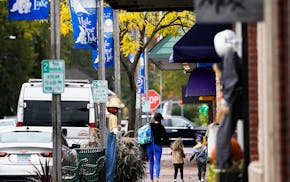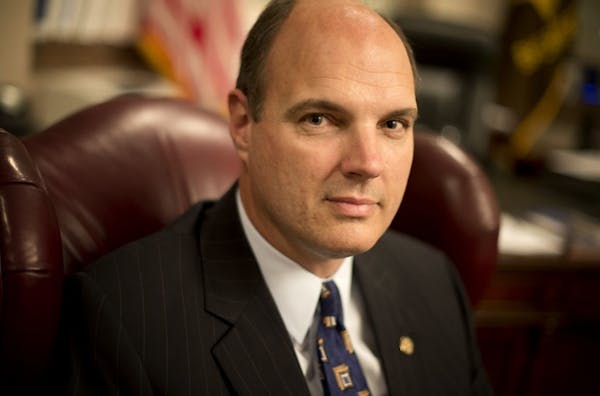Third-grade teacher Val Pap admits she would have skipped a meeting about heroin and prescription drug abuse two years ago.
Why would an educated, nurturing Lino Lakes mother with two ambitious adult sons go to a forum about "filthy, dark alley" heroin addiction?
"I am not sure I would have attended a meeting like this. There would have been no need," Pap told a crowd of more than 200 at the first of three Anoka County forums to discuss heroin, opiates and prescription painkiller abuse. "My suburban middle-class family was immune to drugs like this. … We dedicated our lives to raising our sons in a healthy, happy, stable home."
On Nov. 9, 2012, Pap's 21-year-old son, Tanner, died of a heroin overdose in his Minneapolis apartment. The Centennial High graduate had been studying psychology at the University of Minnesota and aspired to be a drug counselor and psychologist.
Neither his family nor roommates saw any evidence of drug use. His mother said she often wonders whether her intense youngest son tried it to relieve stress and died with one of his first experimentations with the street drug.
"The heroin today does not discriminate. Heroin will welcome anyone into its grasp," Pap said.
"Heroin has taken so much away from us. … He had so much to offer this world. He would have made a difference," she said, her voicing catching.
Pap was one of a number of speakers at the forum, including law enforcement, prosecutors, treatment professionals and former addicts.
Hard hit by a resurgence
"Heroin was brought to our attention in 2009," said detective Dan Douglas of the Anoka County Sheriff's Office. "It hit us square in the face with dead bodies."
Heroin, a problem primarily with middle-age men in the early 1980s, has made a resurgence riding the wave of prescription drug abuse. This time, heroin-addicted teens and young adults are showing up in treatment centers. Many become addicted to prescription painkillers like Vicodin and OxyContin, often raiding family members' medicine cabinets to feed addictions. When that supply runs out, addicts realize they can buy heroin for less than black market prescription drugs. An ounce of heroin on the street costs $200 compared with $1,000 for black market prescription meds, Douglas said.
Heroin accounted for the second-most drug treatment admissions in Minnesota in 2013, and opiates the third-most. Only marijuana topped them, Douglas said.
In the Twin Cities, heroin-involved visits to hospital emergency rooms nearly tripled from 1,189 in 2004 to 3,493 in 2011, according to a recent report by the state's former drug abuse strategy officer. Last year, heroin killed more than 20 people in Anoka County, compared with two five years before that, according to the county medical examiner's office.
"In the Twin Cities, over the past several years, we've seen an enormous increase in heroin abuse as well as prescription drugs. It's reflected in death data, emergency room episodes, people entering drug addiction treatment and law enforcement data," said Carol Falkowski, the state's former drug abuse strategy officer now with Drug Dialogues.
The heroin of today comes from Afghanistan and Mexico. It's exceedingly pure and highly lethal, Douglas said. Heroin lowers respiratory rates. One dose can kill, Douglas said.
"These people die because they simply stop breathing," he said.
Douglas described responding to two lethal overdoses in one day. A 32-year-old Columbia Heights man and a 21-year-old East Bethel man, on furlough from a drug-treatment program, were both found dead in their homes.
"Making those phone calls to parents isn't fun," Douglas said.
"Heroin is the ultimate commodity," he said. "You don't sell the merchandise to the consumer. The customer is sold on the merchandise."
Sheriff James Stuart said addiction fuels other crimes, including thefts, robberies and prostitution, as addicts looking for a fix scramble to come up with cash. Providing drugs to a friend can lead to even more dire consequences: a murder charge, said Anoka County Attorney Tony Palumbo.
"If you provide drugs and it causes death, your first offense is six to nine years in prison and we charge it," Palumbo said.
Two recovering heroin addicts, who received treatment through Minnesota Teen Challenge, also spoke to the crowd. They are the sons of a teacher, a police officer and a paramedic. They played high school sports and come from loving families.
They told how the addiction changed them.
"Heroin instantly drops a person's morals. You steal and rob. You are willing to do dirty things," one of the men said. " … I was spending every paycheck on heroin not to get high, but just to feel better. [After awhile] you just need it to feel normal, not to feel like a nail pounding in your bones."
Shannon Prather • 612-673-4804

Lacrosse lists: 21 top players and the school that's No. 1 for boys and girls

Shop the curbs for free on 'Trash to Treasure Day' in White Bear Lake

Will 'shotgun only' zone for deer in southern Minnesota be abolished?
One killed in head-on crash in Coon Rapids

